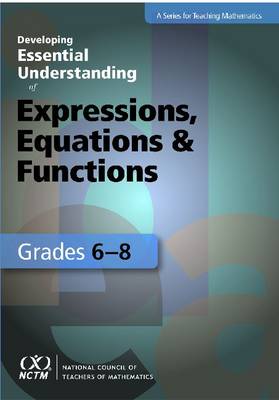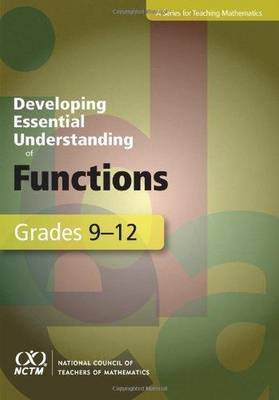Developing Essential Understanding
2 total works
Why do some equations have one solution, others two or even more solutions and some no solutions? Why do we sometimes need to ""switch"" the direction of an inequality symbol in solving an inequality? What could you say if a student described a function as an equation?
How much do you know...and how much do you need to know?
Helping your students develop a robust understanding of expressions, equations and functions requires that you understand this mathematics deeply. But what does that mean?
This book focuses on essential knowledge for teachers about expressions, equations and functions. It is organised around five big ideas, supported by multiple smaller, interconnected ideas - essential understandings. Taking you beyond a simple introduction to expressions, equations and functions, the book will broaden and deepen your mathematical understanding of one of the most challenging topics for students - and teachers. It will help you engage your students, anticipate their perplexities, avoid pitfalls and dispel misconceptions. You will also learn to develop appropriate tasks, techniques and tools for assessing students' understanding of the topic.
Focus on the ideas that you need to understand thoroughly to teach confidently.
How much do you know...and how much do you need to know?
Helping your students develop a robust understanding of expressions, equations and functions requires that you understand this mathematics deeply. But what does that mean?
This book focuses on essential knowledge for teachers about expressions, equations and functions. It is organised around five big ideas, supported by multiple smaller, interconnected ideas - essential understandings. Taking you beyond a simple introduction to expressions, equations and functions, the book will broaden and deepen your mathematical understanding of one of the most challenging topics for students - and teachers. It will help you engage your students, anticipate their perplexities, avoid pitfalls and dispel misconceptions. You will also learn to develop appropriate tasks, techniques and tools for assessing students' understanding of the topic.
Focus on the ideas that you need to understand thoroughly to teach confidently.
Developing Essential Understanding of Functions for Teaching Mathematics in Grades 9-12
by Gwendolyn Lloyd and Sybilla Beckmann
Published 9 December 2010
Are sequences functions? Why can't the popular "vertical line test" be applied in some cases to determine if a relation is a function? How does the idea of rate of change connect with simpler ideas about proportionality as well as more advanced topics in calculus?
How much do you know... and how much do you need to know?
Helping your high school students develop a robust understanding of functions requires that you understand mathematics deeply. But what does that mean?
This book focuses on essential knowledge for teachers about functions. It is organised around five big ideas, supported by multiple smaller, interconnected ideas-essential understandings. Taking you beyond a simple introduction to functions, this book will broaden and deepen your mathematical understanding of one of the most challenging topics for students and teachers. It will help you engage your students, anticipate their perplexities, avoid pitfalls and dispel misconceptions. You will also learn to develop appropriate tasks, techniques and tools for assessing students' understanding of the topic.
Focus on the ideas that you need to understand thoroughly to teach confidently.
How much do you know... and how much do you need to know?
Helping your high school students develop a robust understanding of functions requires that you understand mathematics deeply. But what does that mean?
This book focuses on essential knowledge for teachers about functions. It is organised around five big ideas, supported by multiple smaller, interconnected ideas-essential understandings. Taking you beyond a simple introduction to functions, this book will broaden and deepen your mathematical understanding of one of the most challenging topics for students and teachers. It will help you engage your students, anticipate their perplexities, avoid pitfalls and dispel misconceptions. You will also learn to develop appropriate tasks, techniques and tools for assessing students' understanding of the topic.
Focus on the ideas that you need to understand thoroughly to teach confidently.

